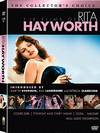





Teresa Wright
Biography | Filmography | Awards | Articles | Remembering | Bibliography | Gallery | News | Downloads | Links | Image Credits | THE LITTLE FOXES | MRS. MINIVER | SHADOW OF A DOUBT | THE PRIDE OF THE YANKEES | THE BEST YEARS OF OUR LIVES
| Interview: | Excerpt 4 |
Reminiscences of Teresa WrightNew York, June 1959On 'Shadow of a Doubt' and 'The Best Years of Our Lives'Q: You said "Shadow of a Doubt" was your favorite picture?Yes, it is. I can't quite say why, but somehow the sum total of that picture -- I thought it was a very good story, very well done; I liked the character I played in it. Somehow I identified with her much more than I have with any other character I played. I do think the picture "Best Years of Our Lives" was a great film. However, I personally always had a slight -- not exactly dislike -- but somehow I couldn't quite go along with the girl I played, which people sometimes think is strange. I think it summed itself up in the scene with the mother and father, where this girl, Peggy, who is supposed to be a mature girl and understanding and sensitive and intelligent -- mature beyond her years -- conducts this scene, with her parents, and supposed to be all these things, where she's defending her own right to break up a marriage which she decided is not good, she turns on her parents and says, "You've forgotten what it's like to be in love." Somehow, to me, it was always so damn stupid and insensitive that I could never really like her. I just thought, "You poop." How can you believe this is a sensitive, intelligent person, and that she's capable of saying this? Well, of course people are capable of saying many stupid things in anger and self-pity. I suppose that's the answer. But somehow there was something about her I didn't quite go with completely, whereas the girl in "Shadow" -- I felt strength in her; she was an interesting person I liked. . . . Most of the things I've done I haven't liked. What I mean is, in the case of "Best Years," I loved the total picture and I loved many aspects of it, but somehow I resented something about this girl. Perhaps I identified very much, if I felt that strongly abut her saying something I didn't like. . . . In this, it was essential to the story. It was part of her character. What I mean is, since she had that in her character, I'd like to have seen it emphasized a little more. She was drawn as a rather noble girl, and this didn't go along with it. It was right -- it was absolutely right -- it shouldn't have been changed, for the story. I just personally didn't like it. © 1959 Columbia University and the Oral History Research Office |
|
Return to the Interview Excerpts
Table of Contents. |
| Now in Print! |
|---|
| Now on DVD! |
|---|
Buy Videos & DVDs |
|
Buy Movie Posters |
|
Buy Movie Posters |
|
Classic
Movie Merchandise |
|
![]() Printer-friendly version.
Printer-friendly version.
![]() Return
to the top.
Return
to the top.
Last updated:
March 10, 2011.
Reel Classics is a registered trademark of Reel Classics, L.L.C.
© 1997-2011 Reel Classics, L.L.C. All rights reserved. No
copyright is claimed on non-original or licensed material.
Terms of
Use.









